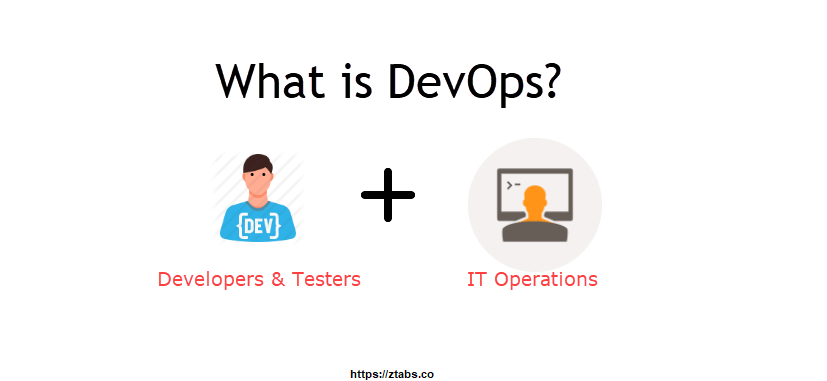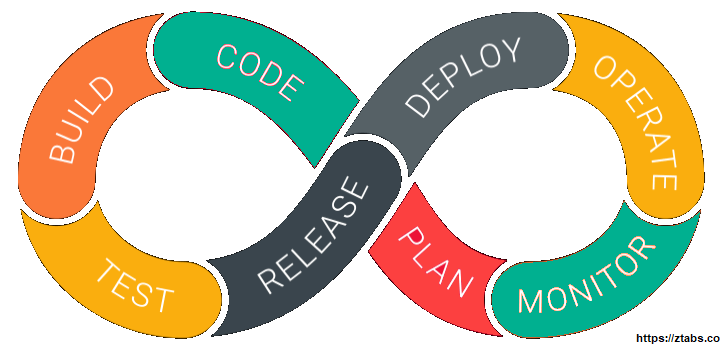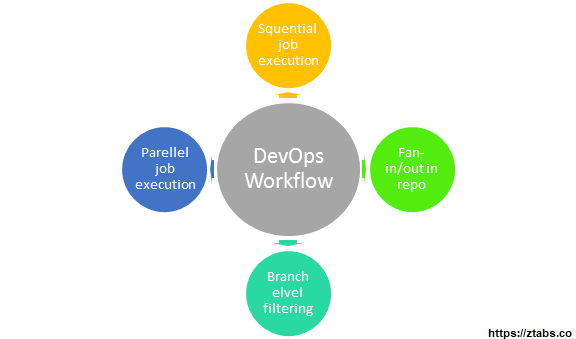
DevOps is a process and culture that helps and promotes the faster deployment of code to the production in an automated way through better collaboration between development and operations teams. Clear from its name; it’s a combination of words Dev and Ops.
DevOps helps the organizations to serve their customers faster and better by continuously and rapidly delivering software applications and service to the customers.
In simple words, DevOps is a way of better communication and collaboration with IT operations team and development to serve customers better.
Before DevOps, Testing and Deployment used to be isolated activities from actual design and development. Development and IT operations team used to work in isolation resulting in extra time consumption in build cycle delaying the actual deployment of software application code to the production. So actual build cycles used to take more time.
Manual code deployments also could lead to human errors. This can result in a break of code/application in the production.Due to lack of proper collaboration, coding and operations team can have different timelines results in unwanted delays in release and build cycles.
There is and been always a demand by the client to ensure the faster and quality deployments and releases. As per Forrester Consultant Study, only 17% of the team can use delivery software fast enough. This proves the pain point that DevOps needs to address.
Let’s compare the traditional waterfall model with the DevOps and see how DevOps helps.
Let’s assume our application has to go live in 2weeks of time, and the code is 80% complete. Our web application is a Fresh launch, and the process to buy servers to make the shipment just started.
|
Traditional |
DevOps |
|---|---|
| After placing an order for new servers, then the Development team operates on analysis and testing. The Operations team works on paperwork as needed in businesses to set up the infrastructure. | After order placement, Dev and Operations work together on the paperwork. This results in better visibility of the infrastructure. |
| Projection about data redundancy, failover, data storage requirements, data center location, etc. are distorted as there is no input from the developers having the core knowledge of the application | Projection about data redundancy, failover, and storage requirements, etc. are very clear and accurate because of proper input from developers. |
| The operations team has no idea of what’s going on with the development. They create a monetary plan based on their understanding | The operations team has a very clear understanding of Everything because of proper collaboration. Operations team communicate with developers and together develop a monitoring plan to address IT and business needs. Advance Application Performance Monitoring (APM) tools can be used as well |
| Before going live, load testing fails the web application and release is delayed | Before going love, load testing slows down the applications. Dev team fixes the bottlenecks. Release is rolled out on time |
DevOps allows the agile development team to do Continuous Integration and Continuous Deployment results in faster releases and shipments to production.
Other reasons are:
DevOps must be adopted in case of large distributed applications with a large number of expected releases and complex development. Cloud-based SAAS applications can be an example.
DevOps should not be adopted in case of highly secure and mission-critical application likes banks and security systems. Such a system needs strict control over production and detailed policies from the management end.

DevOps is a deep integration and collaboration between Development and Operations. Here is how DevOps lifecycle works
This all makes up one DevOps cycle. It is always tried to increase the number of cycles and speed up the completion of the cycle to ensure continuous development and deployment.
Workflows give us an overview of the steps and sequence in which input is provided, actions are performed and then comes the output for an operational process

Workflows help teams to separate, prioritize, and arrange the jobs requested by the users. It also helps in order to mirror their ideal process in jobs configurations.
Here are the stakeholders and communication chain in a typical IT process

Agile address the gaps in the communication between customer and development

While DevOps addresses the gaps in communication between development and Operations

|
Agile |
DevOps |
|---|---|
| Focuses on gaps and barriers between developers and management | Focuses on communication process between Development and Operations |
| About customer and customer requirements | About software deployment and operations |
| Focuses on functional and non-functional readiness of software | Focuses on operation readiness of software |
| Pertains to how development goes on in a company | Pertains to how quality deployment and reliability is ensured. |
| Focus on small sprints. The timetable is much smaller and selected features are done in that period | Goes for consolidated benchmarks deadlines and with major releases |
DevOps focuses on the following six principles
DevOps Engineer is an It professional who works with the development team, operation team, and production IT staff to administer code releases. DevOps engineer should have hard as well as soft skills to communicate and collaborate throughout the chain properly.
DevOps requires frequent increment changes to code version that means frequent deployment and testing. Though DevOps engineers don’t have to code much, they must have a good understanding of code and coding languages.
Following DevOps, certifications can help someone who wants to choose to be a DevOps Engineer as Career.
Automation is the core of the DevOps process. It is essential to automate all the deployment and testing processes and configure them properly to achieve speed and agility.
The challenges face in DevOps automated can be categorized in the following six categories.
Following tools can help in addressing the pain points in the above six categories.
In the current rapid development paradigm, organizational processes flow, and technical needs are changing in weeks and month rather than years. We will soon be witnessing software companies adopting the DevOps process rapidly. DevOps engineers will be the ones with the most control in enterprises over the end-users. It is going to become most-valued skills for an IT professional. A survey conducted by Linux hiring found that 25% of respondent’s job seeker is DevOps expertise. DevOps and continuous delivery are here to stay, but its mainstreaming could take a few years.
Related Topic: